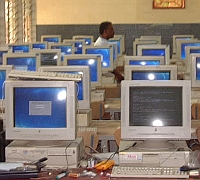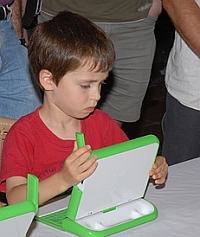The Battle of Emails between One Laptop Per Child and FAIR International is heating up again, and this time Knut Foseide of FAIR is asking Antonio M. Battro, MD, PhD, Chief Education Officer, if a constructivist-centric computer is appropriate for children in OLPC's target group.
Yes, you read that right, FAIR International is now questioning the very basis of OLPC's program - to revolutionize learning in the developing world, leveraging children to educate themselves through the "learning learning" process.
It all started when Antonio sent FAIR an email defending the millions of laptops in children's' hands dream against FAIR's recycled computer model
OLPC offers a different kind of educational model based on a constructivist view of the child's neurocognitive development which is supported by robust scientific evidence.But it seems that Antonio didn't know who he was going toe to toe with. I don't know Knut, but he doesn't sound like a child learning lightweight. He came back with his own detailed email, where he first takes OLPC to task for its target audience:Recycling Pentiums in a PC-lab is not a good model to educate millions of children in the XXIth century. We need something new and adapted to the mental development of our children, not a tool for expert adults but a rich digital and educational environment for all.
In your letter you first state that, quote: “OLPC is working only with the age group 6-12.” If this is true I wish to thank you for conceding this important point of our criticism towards OLPC. I wish to draw your attention to your own OLPC web-site which still clearly states that the exact age range you are targeting is, quote: “elementary and secondary-school-age children: ages 6 to 18 years.” Also the same target group of 6-18 years have been quoted in a vast amount of the news articles about the OLPC that have come to my attention.Interesting. When I spoke with Walter Bender, he said the target age group was 6-16 year olds. No matter, Knut wasn't done with Antonio or One Laptop Per Child. He pulled out the big guns and aimed right at OLPC core philosophy, Constructivism, and questioned not only the lack of software but the entire idea of using Constructivism on OLPC's target age group, 6 to 12/16/18 year olds:
I have not seen any specifications of the OLPC indicating that its hardware has been designed with significant conciderations to such a constructivist view. I therefore assume you refer to the software of OLPC, software that may just as well be run on any new or recycled computer, giving absolutely no advantage to OLPC in specific.Could Knut Foseide of FAIR have a valid argument? Might OLPC be targeting the wrong group with the wrong educational model?Further, your constructivist view may not conclude in favor of the OLPC project at all.
This view namely states that a child's ability of advanced abstract thinking and logical reasoning is limited before the age of 12 years.Not until the child reaches 12-15 years will it have developed necessary executive and information processing skills required for flexible problem solving, postulating and testing of hypothesis, logical reasoning and abstract thinking/ metacognition, skills that will not be completely developed until 20 years of age or later (Donald Stuss et al).
Thus, it is valid to raise the question if children below the age of 12 years actually need an advanced tool like the OLPC in any circumstance.
While I happen to agree with OLPC on hardware - the Children's Machine XO is a technological marvel that trumps any recycled computer implementation - FAIR's accusations that OLPC's educational model, its entire raison d'existence, might be flawed are very serious and need exploration.
Exploration not by the technologically focused, but the pedagogically educated. Educators, practitioners of learning, experts in children's development, please respond.




This whole arguement about OLPC core philosophy and FAIR supplying old computers for PC Labs is ridiculously transparent.
FAIR is scared their whole effort will be undermined by the flooding of third world countries with PERSONAL computers. Who needs a Lab when every kid has their own? All the excuses by FAIR about 'recycling' is just smoke and has no real world advantages. E-Waste will continue to result in landfill until manufacturers commit to making hardware that is easily recycled. FAIR make little or no difference to the e-waste problem.
The other issue is that Computer Labs have a totally different education model to OLPC laptops. Computer Labs teach very little in the way of learning about the World and more about learning to use computers. If the goal for teachers is to teach children to use a computer then a Computer Lab might have a use. The flexibility of each child having their own machine far outweighs the communal lab system.
I prefer the personal ownership approach rather than 'sharing a lab'.
"I have not seen any specifications of the OLPC indicating that its hardware has been designed with significant conciderations to such a constructivist view."
I don't know if constructivism will work as promised, but the hardware is definitely designed with it in mind.
Let's start with the FAIR approach, which consists of a lab with 40 computers or thin-clients:
http://www.fairinternational.org/fi-artikkel_244.nml
If you have 1000 students and the lab is open 8 hours a day, 5 days a week, then each student would get only 1.6 hours a week on a computer. That is not long enough to get anywhere following the constructivist method, since it requires a lot of time.
To meet this requirement the olpc designed an inexpensive computer that students could use in the classroom and also take home, and as a consequence be able to spend many hours a week learning. So yes, the hardware was designed for constructivism.
I don't know why FAIR is being so combative. Both of these groups have similar aims (though different philosophies) and it would be beneficial for them to work together, not bicker.
Let me make an added point from my calculations above. FAIR says it is much cheaper per student than olpc. However, if you are looking at cost per hour of student computer time, I don't see it has any advantage. In fact, in FAIR's $10,000 plan, oplc's are used as thin clients connected to a server, so how could it possibly be less expensive?
Furthermore, since the students will take their computers home where they can also be used by siblings, parents, friends, etc, I would say oplc works out a lot cheaper for the value obtained.
I sense that FAIR may be in danger of losing its primary donors to OLPC. They are likely attempting to save their budget by criticizing OLPC.
Thin clients don't suit the business environment and they don't suit education. I am an IT manager and all my staff want laptops not thin clients or even desktops. They would fight any effort to give them a thin client or even a regular desktop.
Your technology points are all valid, but what about the educational angle? Could OLPC be targeting the wrong age group with the wrong pedagogy? This should concern OLPC watchers more than FAIR's model or technology gripes.
Alan Kay has mostly worked with 5th graders (11 to 12 year olds) and is the first to admit Squeak EToys is not the best option for younger children as it is now. But Seymour Papert has worked extensively with younger children since the 1960s so there is a lot of accumulated experience about how to deal with their needs. It is just a matter of time (this project won't be over in December of 2007, after all) before the right tools are available.
About IT training, it is important to remember that computers change. I used to laugh at the ads in the early 1980s that claimed "if your children participate in our BASIC courses they will be fully prepared for their future jobs". Really? But our current computers look like the Xerox Alto and not like the TRS-80. People expecting the computers of 2017 to look like Windows Vista will be equally surprised...
Considering the article is about educational models it seems strange to me that computer based learning can be categorized by age.
Anecdotally, I have a friend with two young boys aged four and six. Both have been raised in a family where the computer is part of the furniture and both boys have a good grasp of computer usage.
The older one can install Windows (I know its not a big feat) quite happily and set up MSN Messenger. He messaged me the other day telling me to upgrade my installation of MSN as he wanted to play a game with me.
To the younger boy it is all still a bit of a mystery but both read well and are aware of World issues in the news through using the computer.
Childrens minds are capable of almost anything if given the right climate for learning. Constructivist theory has not taken into account that children are capable of learning from a much earlier age than previously thought.
There are many reports of children attending University. http://news.bbc.co.uk/1/hi/education/186917.stm
I wonder if clever children are born or created?
By all examples if a child can read by age three then they are very likely to be advanced by up to five years once they reach their teens.
Hi my name is Goodwill and I reside in South Africa and I am involved in ICT business. I have noticed a nictghy in my country and due to Black empowerment, i find this prokect a succes here in South Africa. Please get back to me and we will engage in a business venture.
With kind regards
Goodwill Matsaba
Mobile:073 259 8434
Email: goodwill@globaldigitals.co.za